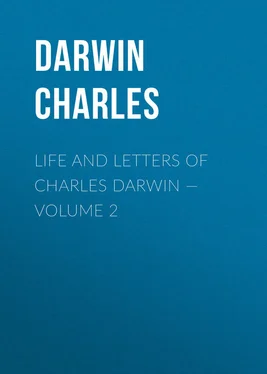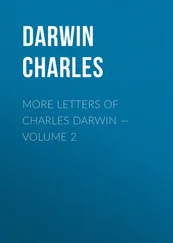Charles Darwin - Life and Letters of Charles Darwin — Volume 2
Здесь есть возможность читать онлайн «Charles Darwin - Life and Letters of Charles Darwin — Volume 2» — ознакомительный отрывок электронной книги совершенно бесплатно, а после прочтения отрывка купить полную версию. В некоторых случаях можно слушать аудио, скачать через торрент в формате fb2 и присутствует краткое содержание. Жанр: foreign_antique, foreign_prose, на английском языке. Описание произведения, (предисловие) а так же отзывы посетителей доступны на портале библиотеки ЛибКат.
- Название:Life and Letters of Charles Darwin — Volume 2
- Автор:
- Жанр:
- Год:неизвестен
- ISBN:нет данных
- Рейтинг книги:3 / 5. Голосов: 1
-
Избранное:Добавить в избранное
- Отзывы:
-
Ваша оценка:
- 60
- 1
- 2
- 3
- 4
- 5
Life and Letters of Charles Darwin — Volume 2: краткое содержание, описание и аннотация
Предлагаем к чтению аннотацию, описание, краткое содержание или предисловие (зависит от того, что написал сам автор книги «Life and Letters of Charles Darwin — Volume 2»). Если вы не нашли необходимую информацию о книге — напишите в комментариях, мы постараемся отыскать её.
Life and Letters of Charles Darwin — Volume 2 — читать онлайн ознакомительный отрывок
Ниже представлен текст книги, разбитый по страницам. Система сохранения места последней прочитанной страницы, позволяет с удобством читать онлайн бесплатно книгу «Life and Letters of Charles Darwin — Volume 2», без необходимости каждый раз заново искать на чём Вы остановились. Поставьте закладку, и сможете в любой момент перейти на страницу, на которой закончили чтение.
Интервал:
Закладка:
With respect to the theological view of the question. This is always painful to me. I am bewildered. I had no intention to write atheistically. But I own that I cannot see as plainly as others do, and as I should wish to do, evidence of design and beneficence on all sides of us. There seems to me too much misery in the world. I cannot persuade myself that a beneficent and omnipotent God would have designedly created the Ichneumonidae with the express intention of their feeding within the living bodies of Caterpillars, or that a cat should play with mice. Not believing this, I see no necessity in the belief that the eye was expressly designed. On the other hand, I cannot anyhow be contented to view this wonderful universe, and especially the nature of man, and to conclude that everything is the result of brute force. I am inclined to look at everything as resulting from designed laws, with the details, whether good or bad, left to the working out of what we may call chance. Not that this notion AT ALL satisfies me. I feel most deeply that the whole subject is too profound for the human intellect. A dog might as well speculate on the mind of Newton. Let each man hope and believe what he can. Certainly I agree with you that my views are not at all necessarily atheistical. The lightning kills a man, whether a good one or bad one, owing to the excessively complex action of natural laws. A child (who may turn out an idiot) is born by the action of even more complex laws, and I can see no reason why a man, or other animal, may not have been aboriginally produced by other laws, and that all these laws may have been expressly designed by an omniscient Creator, who foresaw every future event and consequence. But the more I think the more bewildered I become; as indeed I probably have shown by this letter.
Most deeply do I feel your generous kindness and interest.
Yours sincerely and cordially, CHARLES DARWIN.
{Here follow my father's criticisms on the 'Edinburgh Review'}:
"What a quibble to pretend he did not understand what I meant by INHABITANTS of South America; and any one would suppose that I had not throughout my volume touched on Geographical Distribution. He ignores also everything which I have said on Classification, Geological Succession, Homologies, Embryology, and Rudimentary Organs — page 496.
He falsely applies what I said (too rudely) about "blindness of preconceived opinions" to those who believe in creation, whereas I exclusively apply the remark to those who give up multitudes of species as true species, but believe in the remainder — page 500.
He slightly alters what I say, — I ASK whether creationists really believe that elemental atoms have flashed into life. He says that I describe them as so believing, and this, surely, is a difference — page 501.
He speaks of my "clamouring against" all who believe in creation, and this seems to me an unjust accusation — page 501.
He makes me say that the dorsal vertebrae vary; this is simply false: I nowhere say a word about dorsal vertebrae — page 522.
What an illiberal sentence that is about my pretension to candour, and about my rushing through barriers which stopped Cuvier: such an argument would stop any progress in science — page 525.
How disingenuous to quote from my remark to you about my BRIEF letter [published in the 'Linn. Soc. Journal'], as if it applied to the whole subject — page 530.
How disingenuous to say that we are called on to accept the theory, from the imperfection of the geological record, when I over and over again [say] how grave a difficulty the imperfection offers — page 530."]
CHARLES DARWIN TO J.D. HOOKER. Down, May 30th [1860].
My dear Hooker,
I return Harvey's letter, I have been very glad to see the reason why he has not read your Essay. I feared it was bigotry, and I am glad to see that he goes a little way (VERY MUCH further than I supposed) with us...
I was not sorry for a natural opportunity of writing to Harvey, just to show that I was not piqued at his turning me and my book into ridicule (A "serio-comic squib," read before the 'Dublin University Zoological and Botanical Association,' February 17, 1860, and privately printed. My father's presentation copy is inscribed "With the writer's REPENTANCE, October 1860."), not that I think it was a proceeding which I deserved, or worthy of him. It delights me that you are interested in watching the progress of opinion on the change of Species; I feared that you were weary of the subject; and therefore did not send A. Gray's letters. The battle rages furiously in the United States. Gray says he was preparing a speech, which would take 1 1/2 hours to deliver, and which he "fondly hoped would be a stunner." He is fighting splendidly, and there seems to have been many discussions with Agassiz and others at the meetings. Agassiz pities me much at being so deluded. As for the progress of opinion, I clearly see that it will be excessively slow, almost as slow as the change of species... I am getting wearied at the storm of hostile reviews and hardly any useful...
CHARLES DARWIN TO C. LYELL. Down, Friday night [June 1st, 1860].
... Have you seen Hopkins (William Hopkins died in 1866, "in his sevent-third year." He began life with a farm in Suffolk, but ultimately entered, comparatively late in life, at Peterhouse, Cambridge; he took his degree in 1827, and afterward became an Esquire Bedell of the University. He was chiefly known as a mathematical "coach," and was eminently successful in the manufacture of Senior Wranglers. Nevertheless Mr. Stephen says ('Life of Fawcett,' page 26) that he "was conspicuous for inculcating" a "liberal view of the studies of the place. He endeavoured to stimulate a philosophical interest in the mathematical sciences, instead of simply rousing an ardour for competition." He contributed many papers on geological and mathematical subjects to the scientific journals. He had a strong influence for good over the younger men with whom he came in contact. The letter which he wrote to Henry Fawcett on the occasion of his blindness illustrates this. Mr. Stephen says ('Life of Fawcett,' page 48) that by "this timely word of good cheer," Fawcett was roused from "his temporary prostration," and enabled to take a "more cheerful and resolute tone.") in the new 'Fraser'? the public will, I should think, find it heavy. He will be dead against me, as you prophesied; but he is generally civil to me personally. ('Fraser's Magazine,' June 1860. My father, no doubt, refers to the following passage, page 752, where the Reviewer Expresses his "full participation in the high respect in which the author is universally held, both as a man and a naturalist; and the more so, because in the remarks which will follow in the second part of this Essay we shall be found to differ widely from him as regards many of his conclusions and the reasonings on which he has founded them, and shall claim the full right to express such differences of opinion with all that freedom which the interests of scientific truth demands, and which we are sure Mr. Darwin would be one of the last to refuse to any one prepared to exercise it with candour and courtesy." Speaking of this review, my father wrote to Dr. Asa Gray: "I have remonstrated with him [Hopkins] for so coolly saying that I base my views on what I reckon as great difficulties. Any one, by taking these difficulties alone, can make a most strong case against me. I could myself write a more damning review than has as yet appeared!" A second notice by Hopkins appeared in the July number of 'Fraser's Magazine.') On his standard of proof, NATURAL science would never progress, for without the making of theories I am convinced there would be no observation.
... I have begun reading the 'North British' (May 1860.), which so far strikes me as clever.
Phillips's Lecture at Cambridge is to be published.
Читать дальшеИнтервал:
Закладка:
Похожие книги на «Life and Letters of Charles Darwin — Volume 2»
Представляем Вашему вниманию похожие книги на «Life and Letters of Charles Darwin — Volume 2» списком для выбора. Мы отобрали схожую по названию и смыслу литературу в надежде предоставить читателям больше вариантов отыскать новые, интересные, ещё непрочитанные произведения.
Обсуждение, отзывы о книге «Life and Letters of Charles Darwin — Volume 2» и просто собственные мнения читателей. Оставьте ваши комментарии, напишите, что Вы думаете о произведении, его смысле или главных героях. Укажите что конкретно понравилось, а что нет, и почему Вы так считаете.












